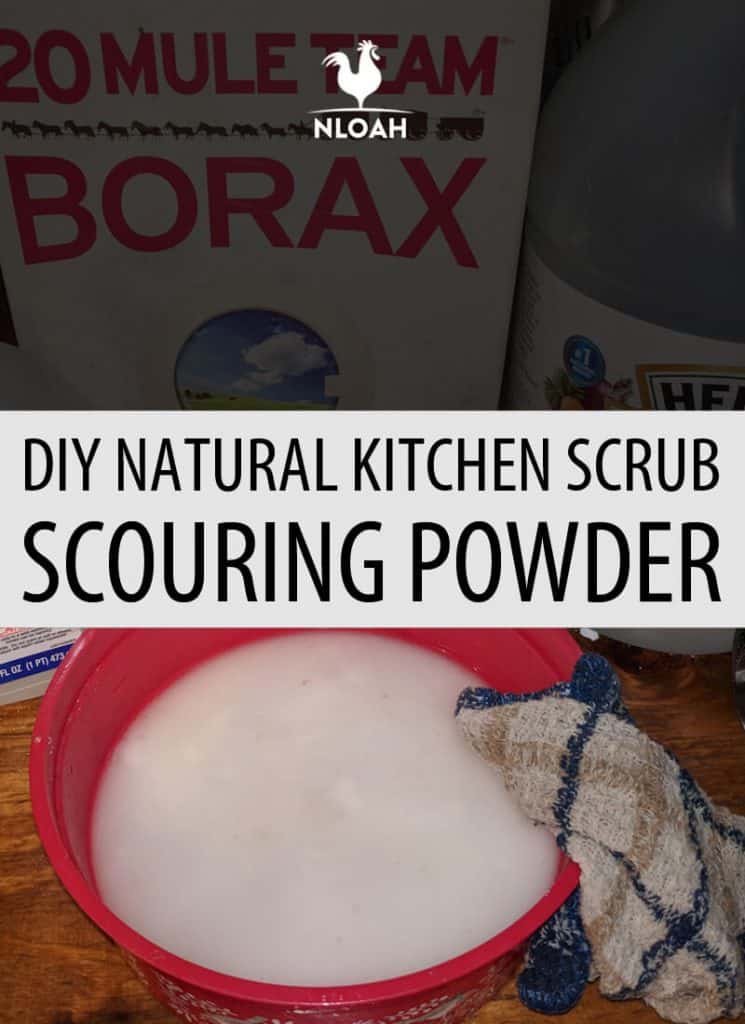Scouring the kitchen is not a fun job, but sometimes the messes around the homestead simply call out for that type of abrasive elbow-grease type of scrubbing.
Just because your need a quality scouring powder you can depend on to clean up and disinfect life’s messes, that does not mean you have to allow chemicals to invade your kitchen. Cleaning your kitchen (and even bathroom) properly does not require bringing Comet or similarly harsh scouring powders into your home.
DIY natural scouring powders can be potent as commercially manufactured ones. Scouring powders are excellent for cleaning and disinfecting hard surfaces, like kitchen countertops, ceramic tiles, vinyl tiles, the stove top, and fiberglass surfaces.
Making and using DIY natural scouring powder will not likely make the scrubbing of your kitchen anymore enjoyable, but you’d be able to literally eat off of your kitchen counter – if so inclined – and not worry about ingesting potentially toxic chemicals.
Scouring Powder Basic Ingredients
Baking Soda
There are multiple DIY natural scouring powder recipes floating around the internet, and some work better than others. But every last one I have ever come across uses baking soda as a base ingredient.
Baking soda works so incredibly well as a scouring powder because it is both a natural disinfectant has consistent mildly abrasive qualities. Bakings soda works as well on germs as it does getting stains out.
It is chlorine free, making it safe to use both around your children and around pets. Unlike even some supposedly “natural” commercially manufactured cleaners, baking soda boxes do not come with exposure or small ingestion warning labels.
Baking soda, like distilled white vinegar, is an economical all-in-one natural cleaning tool for your homestead. It will also sanitize and deodorize every surface it is used to scrub.
There is only one caution that should be issued when using baking soda as part of any natural scouring scrub recipe. It is not recommended for use on plastic surfaces, porcelain or on some models of appliances, because it may be too abrasive for the decorative covering on the kitchen tools.
How to Reduce Baking Soda Residue
- Sprinkle the baking soda scouring powder onto a damp rag or sponge.
- Rub the natural cleaner into the kitchen surface being cleaned.
- Rinse with water.
- To remove the residue, you can also cleanse and lightly scrub the area with distilled white vinegar before using the natural kitchen scouring scrub.
Salt
Simply mixing together equal parts of baking soda and salt will give you a powerful natural scouring powder. The two little white powdery substances compliment each incredibly well when combined as a cleaning agent.
Salt works as a catalyst for the baking soda, much in the same way distilled white vinegar does. Both natural ingredients enhance the deodorizing and cleaning attributes which salt provides.
Baking soda, when used alone or with a tiny bit of water, can leave a film behind.
The Kitchen Scrub Recipe
Watch my video below to see how to make this natural kitchen scouring powder recipe on your own at home:
Optional Recipe Additives
- o make a more potent natural scouring powder, mix in one tablespoon of Borax.
- For tough scouring jobs, allow the baking soda based mixture to settle onto the problem area for 60 minutes before scrubbing it away.
- If the kitchen mess needs a more intense scrubbing to remove all residue after scouring, grate one half of a bar of your favorite natural soap to the scrubbing recipe. Squirt the area to be scoured slightly with water before scrubbing.
- Occasionally, a film could be left on the kitchen counter or appliances after scrubbing. Simply squirt the area with distilled white vinegar and wipe dry to remove any film or streaking.
If you find yourself missing the sweet smells of chemically infused commercially manufactured kitchen scouring powders, add some natural scents of your own to the mix.
Grind up approximately 1 tablespoon per ½ cup of baking soda used to infuse their aroma into the natural kitchen scouring powder. You can pulverize the dried herbs in a food processor, using a mortar and pestle, or a coffee grinder. Remember, the herbs must be ground to the point where using the kitchen scouring powder will not clog up sink drains.
Essential oils can also be added this all-natural kitchen scrubbing powder recipe. Using the oils is a faster way to add some pleasant scent to the mixture, and will not require any grinding be done either manually or with an appliance that has to be cleaned after.
Add up to 8 drops of your favorite essential oils per every ½ cup of baking soda used. Rosemary, lemon, and lavender essential oils leave the kitchen smelling fresh and clean, and are especially used during spring and summer months.
During the winter, consider adding some cinnamon, pine, or clove essential oil to the kitchen scouring powder to bring about a more robust scent to the home while all of the winters are closed up for the cold season.
Using essential oils mixed in with the natural kitchen scouring powder recipe allows you to take advantage of not only their pleasant aroma, but also their antifungal, antibacterial, and antiviral properties.


Tara lives on a 56 acres farm in the Appalachian Mountains, where she faces homesteading and farming challenges every single day, raising chickens, goats, horses, and tons of vegetables. She’s an expert in all sorts of homesteading skills such as hide tanning, doll making, tree tapping, and many more.

Do you have a You Tube vlog? I would enjoy subscribing if you do. I too am a homesteader, raised all my children off the good earth with numerous varieties of animals and giant gardens that I canned well over 1,000 quarts and pints of every type of food from meat off the farm to vegetables, soups and even cakes. I would like to learn more on tanning and perhaps other valuable things you know that I do not.. yet?.
Brook in Northern Indiana
Hi Brook,
Unfortunately we don’t have a youtube channel, but we do publish videos that you can watch either within the articles, or in the sidebar of each article. Regarding hide tanning, Tara covered this topic in a 3-part article. You can read part 1 here: https://www.newlifeonahomestead.com/tan-hides-using-traditional-methods-part-1/